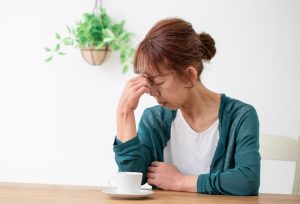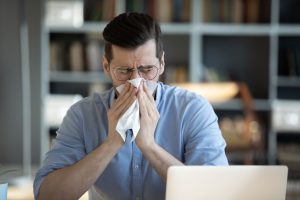Can Allergies Make You Tired? What You Need to Know About Allergy Fatigue

It may not seem obvious, but allergies can cause serious fatigue in addition to other frustrating symptoms. They can drain your body’s energy and keep you from getting a good night’s sleep, leaving you feeling exhausted and hazy during the day time. Feeling constantly fatigued from battling allergies can affect your quality of life in a big way. If you’re tired of allergies making you tired, work with an expert ENT specialist who can help you get you back to restful nights and clear-headed days.
The Quick Answer: Yes, Allergies Can Cause Fatigue
Allergies can make you feel tired for several different reasons. When the body senses an irritant or allergen, the immune system releases chemicals to try and fight it off. If your body is constantly exposed to allergens, such as mold, dust mites, or pet dander, the immune system is constantly working hard to keep releasing these chemicals. This can cause your system to feel overworked and weakened, which can leave your body exhausted.
These same chemicals, called histamines, cause the inflammation and irritation that bring on annoying allergy symptoms. Symptoms like stuffy nose, cough, and throat clearing can often lead to trouble sleeping, which can affect your ability to recharge during the night. This is another way allergies can make you feel tired and foggy, day and night.
How Do Allergies Cause Fatigue?
Overworked Immune System
When your body senses the threat of allergens, it works to rapidly produce and release histamines, the chemical that causes allergy symptoms. If your body continues to be exposed to the irritant, your immune system will keep working in overdrive. This can make your body tired and also weaken your immune system, which can make you more vulnerable to other illnesses.
Night Time Symptoms Causing Lack of Sleep
Allergy symptoms such as congestion, coughing, sneezing, runny nose, and general feelings of discomfort can make it difficult to fall asleep and wake you up constantly throughout the night. This can cause feelings of fatigue and fogginess during the day time, since your body hasn’t properly recharged.
Symptoms which often disrupt sleep include:
- coughing
- itching eyes
- sneezing
- skin itching
- runny nose
- throat clearing
Congestion Can Cause Brain Fog
A stuffy, swollen nose can make it difficult to think clearly, often causing a hazy or tried feeling. Many have termed this feeling “brain fog,” and it results from the congestion and pressure in your nasal and sinus air passages. Without treating allergy symptoms, and sometimes contributing sinus issues, the inflammation, irritation, and runny nose at the root of this issue will keep making you feel foggy.
Certain Allergy Medications Can Worsen Fatigue
Even though they work to relieve some symptoms, certain allergy medicines can actually make you more tired. Antihistamines in particular have been known to cause drowsiness, however, most newer, second-generation pills are designed to be non-drowsy. Still, it is important to always read labels carefully, and consult with a doctor if unsure which allergy medications may cause increased fatigue.
Allergies Can Worsen Sleep Apnea
Allergies can make certain sleeping conditions worse. Symptoms like inflammation and stuffy nose often cause you to breathe improperly, which can cause or worsen snoring and sleep apnea. When your airways are blocked or restricted, the lungs and even the heart struggle to get enough oxygen. The lack of air causes your body to wake itself up, interrupting your sleep sometimes hundreds of times in a given night. This explains the exhaustion that most people experience when suffering from sleep apnea, especially if allergies are making things worse.
How to Prevent Allergy Fatigue
The best way to prevent allergy fatigue is to find an effective treatment option for your allergies. The first step in managing allergies and preventing symptoms like fatigue is to find out which specific allergens trigger your reactions. After this diagnosis, there are ways to minimize allergies and avoid fatigue. You can minimize allergy fatigue in several ways:
Discover the Source of your Symptoms
You may already believe that allergies are the root cause of your fatigue and other symptoms, but there may be more to it than that. An ear, nose and throat specialist (ENT) can fully examine to make sure other issues such as sinusitis or deviated septum aren’t causing or worsening your issues. They can also conduct an accurate allergy test to find out exactly which allergies you have, and how severe each one may be. Common triggers of allergies include dust mites, mold, pet dander, and pollen.
Limit Exposure
For certain allergies, such as food or pet dander, it may be possible to avoid exposure to the allergen entirely. This may require cutting out certain foods or products from your lifestyle, or doing your best to avoid certain animals that trigger your symptoms. Regularly cleaning the home and changing air filters can also help reduce exposure to troublesome outdoor or indoor allergens. Being aware of the pollen account and avoiding high allergen-count days during the spring and summer months can also help prevent allergy symptoms and fatigue.
Treat Your Allergies
There are many different ways to treat allergies, so it’s a matter of choosing the option that works best for your allergy type, your body, and your lifestyle. Consider over the counter antihistamines or decongestants to reduce swelling and congestion, which can help you sleep better and feel less tired during the day. Other long-term immunotherapy treatments, such as allergy shots and allergy drops, can help relieve symptoms and even eliminate the need for other allergy medications. An experienced ENT doctor can help you determine the best way to treat allergies causing fatigue.
Choose Non-Drowsy Medications
Certain allergy medications like antihistamines can cause drowsiness as a side effect, making you feel tired and foggy during the day when the meds are fighting other symptoms. Most newer, second-generation allergy medicines do not cause drowsiness, but it’s important to read labels and make sure the drug you choose won’t cause drowsiness or fatigue.
How to Treat Fatigue Caused by Allergies

If allergies are truly the source of your fatigue, treating the allergies is the best way to treat the fatigue. An ENT specialist or allergist can help you determine or confirm the root cause of your issues. After conducting an allergy test in the office or at home to diagnose your allergies, consider which allergy treatment option may work best to treat your fatigue and eliminate other symptoms.
1. Try a Neti Pot
Some people are able to reduce their symptoms and get better sleep by using a neti pot. This device makes it easy to use a saline solution in the nostrils to clear the nasal airways, reduce swelling, and relieve other annoying systems. This can help you sleep better and alleviate your fatigue.
2. Consider Allergy Medications
Allergy medications such as antihistamines, decongestants, and corticosteroids can help relieve certain symptoms. Many patients choose a combination antihistamine and decongestant treatment, available over the counter, to help get rid of the runny nose, sneezing, and cough that keep them up at night. Allergy medications are available as oral pills, liquids, sprays, and eye drops, and each has their own advantages and potential drawbacks. It’s important to consider all of the options and review your choices with a doctor to make sure you’ve chosen wisely. Each person’s body reacts differently to allergy medications, so it may take some trial and error to find the medicine that works best for you to reduce fatigue. Note that some allergy medicines can actually cause drowsiness and make fatigue worse, which is why it’s important to read labels.
3. Consider Immunotherapy Allergy Drops
While allergy medications provide short-term relief from symptoms, and often lose their effectiveness if overused, immunotherapy is a more long-term approach to allergy fatigue treatment. Immunotherapy slowly introduces the body to more and more of the allergen(s) it is allergic to so that it builds up a tolerance and no longer reacts as strongly. Allergy shots are an older form of immunotherapy that are very effective, but this treatment has some associated risks and requires frequent office visits. Allergy drops are just as effective but can be done easily from home with daily drops under the tongue, making this one of the best ways to manage and eliminate allergies causing fatigue.
Tips for Getting Quality Sleep with Allergies
If your allergies are keeping you from getting good sleep, there are a few tips that can help you get back to a good night’s rest. This will help you feel less tired and more alert during the day.
Shower Before Bed
Taking a shower before you lay down in bed can help wash dust, pollen and other allergens off of your skin and hair, so you aren’t bringing these irritants to sleep with you. It also naturally lowers your body’s temperature which can help you fall asleep and stay asleep longer. Getting better sleep after a shower helps you feel more rested and awake.
Wash Sheets Frequently
Keep your bedding and pillow cases fresh and clean to avoid having allergens affect you while you sleep. This is especially important for those with dust mite allergies, and for those with pet allergies who have pets in the home. To avoid irritants in your bed, wash your sheets, pillow cases, and comforter in hot water once a week.
Keep Your Head Slightly Elevated
If allergies are causing congestion or runny nose, prop your head up slightly by adding another pillow or two. This can help improve draining and airflow in the nasal passages, clearing mucus and allowing you to get better sleep.
Consider Keeping Pets Out of the Bedroom
Having pets on the bed can be an issue even if this isn’t your primary allergy, since pets can have dust, pollen or other allergens clinging to their fur when they enter the room. Those with a pet dander allergy should strongly consider keeping pets off of the bed or out of the bedroom to make sleeping easier without allergy symptoms.
Use an Air Purifier
Placing an air purifier in the bedroom can drastically improve the air quality and reduce airborne allergens in the room. Be sure to change the filter frequently to get the most effective air purification. You may also consider a humidifier to keep the air moist, since allergies can dry you out, but be careful to clean these regularly to avoid mold and bacteria. Removing allergy triggers from the air helps your sleep better at night, which leaves you feeling more rested and less fatigued the next day.
Find Relief from Fatigue Caused by Allergies
Fatigue can be caused by allergies and this can be frustrating. But it doesn’t have to be forever. Diagnosing and treating your underlying allergies is the best way to find relief from your symptoms, get better sleep, and wake up feeling rested. Being tired can negatively impact your quality of life in many ways, but an ENT expert can help you address your issues and get back to a life free from fatigue from allergies. Schedule an appointment to discuss your allergy symptoms with a specialist today.


